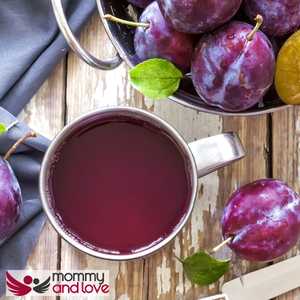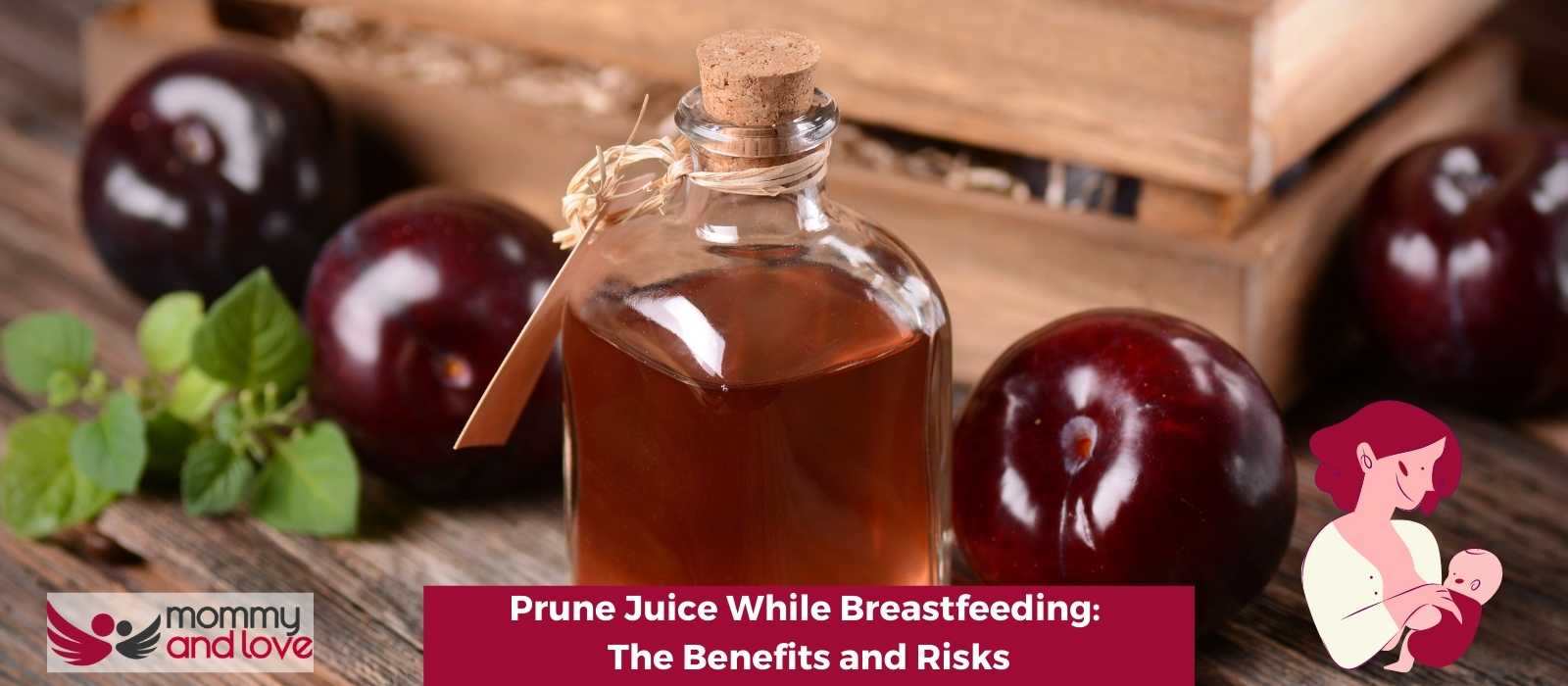If you’re a breastfeeding mother, you may be wondering if it’s safe to drink prune juice.
In this post, we’ll explore the safety of drinking prune juice while breastfeeding and give you some health tips on how to enjoy this healthy drink and add prune juice to your diet while nursing. Keep reading for more information!
What is Prune Juice and Its Health Benefits?

Prune Juice is made from prunes, water and sugar. It is a popular juice that helps to relieve constipation.
The vitamins and minerals in prunes prevent several health problems such as heart failure and improve various body functions.
It also contains B vitamins, vitamin A and iron. Other nutrients present help with the health of the nervous system, good hemoglobin count and suppresses hunger pangs. It has enough fiber to prevent constipation.
The iron content in prune juice helps with blood glucose levels and anemia.
Prune juice also promotes nerve impulses.
Prunes can help with urinary bladder functions, constipation resulting from lack of fiber and blood pressure substantially. This nutritious fruit acts and promotes smooth bowel movements and smooth muscle contractions.
Interestingly, unlike drinking the juice, consuming dried plums promotes muscle health and other body functions as well as regulates weight gain.
Is Prune Juice Safe for Breastfeeding?
Yes, you can drink fresh prune juice. Like any food, you may be able to drink prune juice and eat prunes without experiencing any problems at all.
When consumed in large amounts, though, your baby may experience gas, bloating or diarrhea due to the sugar sorbitol and dietary fiber contained in prunes.
If you find that these symptoms persist or become worse after frequent consumption of prune juice, consider discontinuing it from your diet altogether until your baby has weaned off breastmilk and eating solid foods.
What Are the Risks of Drinking Prune Juice While Breastfeeding?
There are a few possible health concerns and risks associated with drinking prune juice while breastfeeding.
For example, prune juice may cause gas and bloat in both the mother and the baby.
It is also important to be aware that prune juice can interact with certain medications, so it is always best to check with a healthcare professional before consuming prune juice while breastfeeding.
Additionally, it is high in sugar and calories, so it should be consumed in moderation.
If you’re worried about its content, you can always prepare prune juice or make your own pureed prunes at home.
How Much Prune Juice Can You Drink While Breastfeeding?
High nutritional content of this juice makes it highly recommended for nursing mothers but in moderation. It offers a lot of prominent health benefits and a good source of vitamins and minerals, which can be beneficial for both mother and baby.
However, it is important to remember that it’s fresh juice are also high in sugar, so it should be consumed in moderation to avoid weight gain. It can also cause gas and bloating, so it is important to start with small amounts and increase as tolerated.
Will Prune Juice Give My Baby Gas?

Sorbitol is a sugar alcohol that occurs naturally in prunes. It’s also found in some sugar-free products and gums.
Sorbitol has laxative qualities and can cause intestinal problems for some children when it passes through their mothers’ breastmilk.
If your baby has gas, bloating, cramping or diarrhea after you drink prune juice or eat other sorbitol-containing foods, he may be sensitive to sorbitol. You can try limiting the amount of or avoiding it altogether.
Do Prunes Pass Through Breastmilk?
Prunes and prune juices are high in fiber, which can make a baby gassy or irritable. In some cases, they can even cause diarrhea. If your baby has diarrhea, avoid prunes/prune juices while breastfeeding.
However, if your breastfed babies are constipated, the fiber found in prunes and fresh prune juice may help relieve his constipation naturally by moving things along in his digestive tract.
Does Eating Prunes While Breastfeeding Help Baby Poop?
Prunes (European Plum) and dried plums have a lot of fiber and contain sorbitol, which is a natural laxative. That’s why people often eat prunes to help with constipation.
Some studies suggest that prunes may be more effective than other types of foods at relieving constipation, too.
Prunes helps constipated babies poop more often, both those who are fed breast milk exclusively and formula-fed babies. It makes their stools less hard, thereby preventing pebble-like stools.
It’s important that you do not give your baby prune juices or whole prunes as a first food. It is also essential to wait until your child is between four and six months old before giving them any type of solid food, including prune puree mixed with breastmilk or formula. They can actually add extra flavor to food for older children.
Does Prune Juice Increase Breast Milk?
Prune juice is often recommended for parents who want to increase their breastmilk supply. It’s not clear, however, if it does help boost breastmilk.
If you’re experiencing a shortage of breastmilk, there are more reliable ways to boost your supply than drinking prune juices (such as nursing more frequently and eating nutritious foods). It can also cause diarrhea and other gastrointestinal side effects in your baby.
Conclusion on Taking Prunes When Lactating
It seems that there are some benefits and risks to drinking prune juice while breastfeeding. Prunes help body tissues. It also contains a lot of nutrients and is a good source of minerals boron and potassium. The mineral boron helps build strong muscles.
If you have an overactive bladder and constipation, the high fiber content of this fruit will improve your bowel movement.
However, it may be beneficial for both mother and baby, but it can also cause gas or bloat in the child as well as constipation if they’re not careful about how much is consumed.
It’s important to speak with a healthcare professional before adding prune juices into your diet while breastfeeding.

This article was written by Sandra Baker – full time writer and the mother of four amazing kids (including twins!)
She’s also a breastfeeding counselor and has spent years helping new parents learn how to care for their children. When she’s not writing or caring for her children, Sandra likes to spend time reading and taking walks with her husband.




